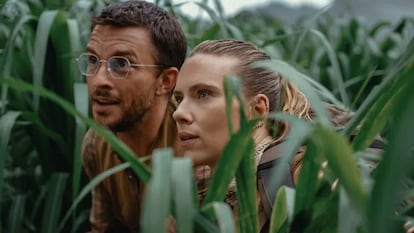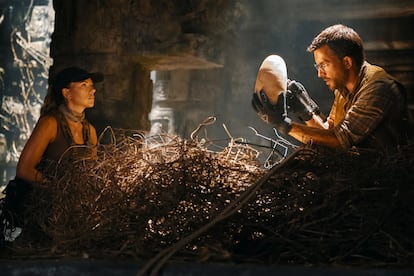‘Jurassic World: Rebirth’: When product placement devours the film and nostalgia turns toxic
The unnecessary continuation of the franchise, following two completed trilogies, dives deeper into genetic mutation to add another twist to a struggling summer blockbuster

What they call product placement — that is, the subtle advertising of brands in movies and series — is nothing new, and by now, it hardly bothers anyone. The double saga of Jurassic Park and Jurassic World has eagerly embraced this type of marketing, but something changes when you watch the latest installment and, rather than a piece of entertainment, it feels like a vending machine for snacks.
In Jurassic World: Rebirth, the overuse of this commercial strategy goes isn’t just a minor distraction — it becomes a symbol of everything that doesn’t work in this needless extension of a franchise that already wrapped up two complete trilogies. The product — not just the kind that says “Visit our bar!” — literally consumes a film already devoured by its own monsters.
From the opening shots of Jurassic World: Rebirth, the candy display is hard to miss. When the paleontologist played by Jonathan Bailey faces the crucial decision of whether to join an expedition to a remote equatorial location to extract DNA from three dinosaur species — whose blood will supposedly enable the creation of a miracle drug to ensure the survival of the human race — he makes his choice by reaching into his pocket and pulling out a tin of Altoids (the menthol mints found in every movie theater, gas station, and airport across the U.S.). Without a single line of dialogue, his moment of deliberation is marked only by the sound of the mint rattling around in his mouth.
And that’s not the end of it: the Altoids tin gets another star appearance — this time even more absurd and blatant — during one of the film’s rare nods to the prehistoric epic tone of the original dinosaur saga.
There’s more: early in the film, a wrapper from another instantly recognizable candy brand gets its own moment of glory when a scientist drops it on the floor, triggering an accident in the secret lab that sets off the plot of this failed continuation of a franchise that began in 1993, redefining the blockbuster on the brink of the digital age.

Three decades have passed since then, and as we are reminded, humans are no longer interested in dinosaurs; no one visits museums dedicated to their evolution anymore, and they are once again doomed to extinction. The person responsible for ensuring the public doesn’t turn its back on years of prehistoric fantasies is British director Gareth Edwards, known for Godzilla (2014) and Rogue One: A Star Wars Story (2016). After his last film, The Creator (2023), bombed at the box office, he was recruited to continue the Jurassic work when David Leitch (an action film specialist and creator of the John Wick franchise) left the project.
The script by David Koepp — who in the 1990s wrote the first two Jurassic Park films before and after his success with Brian De Palma’s Mission: Impossible — is just a fragile skeleton that mimics what we already know through two parallel plots: one about the professional expedition, led by the always compelling Scarlett Johansson; and the other about a family man (Manuel García-Rulfo) who gets caught up in the adventure when he goes sailing with his two daughters and the older daughter’s boyfriend. The two storylines blend the dysfunctions of this accidental family of mercenaries with the values of a (close-knit) Latino family.
This time, it’s all about mutations, freaky alien-like dinosaurs, and obtaining DNA from species that roam land, sea, and air. The nods and references are the most obvious — anything goes as long as it treads familiar ground: from Jaws to Alien, from Indiana Jones to King Kong, with a stop at E.T. (including an explicit tribute featuring a handful of M&M’s chocolates). Such a patchwork of adventures and sweets is barely held together despite an appealing cast and increasingly sophisticated digital effects. Humor and pure enjoyment are in short supply.
What remains is depressing. This summer marks the 50th anniversary of Jaws — the very first summer blockbuster, the film that changed everything in Hollywood. Half a century later, the legacy of that milestone is downright lamentable, with Hollywood turned into a machine of shallow, empty pop nostalgia, leaving no room for risk or creativity. Like in a decaying circus, the poor beasts are old and exhausted after a lifetime performing the same act.
Jurassic World: Rebirth
Director: Gareth Edwards.
Cast: Scarlett Johansson, Mahershala Ali, Jonathan Bailey, Rupert Friend, Manuel García-Rulfo.
Genre: Adventure.
Running time: 134 minutes.
Premiere: July 2, 2025.
Sign up for our weekly newsletter to get more English-language news coverage from EL PAÍS USA Edition
Tu suscripción se está usando en otro dispositivo
¿Quieres añadir otro usuario a tu suscripción?
Si continúas leyendo en este dispositivo, no se podrá leer en el otro.
FlechaTu suscripción se está usando en otro dispositivo y solo puedes acceder a EL PAÍS desde un dispositivo a la vez.
Si quieres compartir tu cuenta, cambia tu suscripción a la modalidad Premium, así podrás añadir otro usuario. Cada uno accederá con su propia cuenta de email, lo que os permitirá personalizar vuestra experiencia en EL PAÍS.
¿Tienes una suscripción de empresa? Accede aquí para contratar más cuentas.
En el caso de no saber quién está usando tu cuenta, te recomendamos cambiar tu contraseña aquí.
Si decides continuar compartiendo tu cuenta, este mensaje se mostrará en tu dispositivo y en el de la otra persona que está usando tu cuenta de forma indefinida, afectando a tu experiencia de lectura. Puedes consultar aquí los términos y condiciones de la suscripción digital.









































